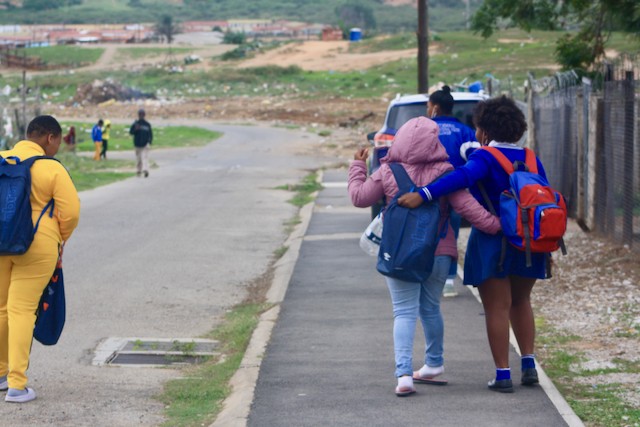Schools close at 11am in Mandela Bay because there is no water
Eastern Cape Department of Education says it is the municipality’s responsibility
Learners from Mthonjeni Primary School going home at 11am on Friday because their school had no water. Photo: Thamsanqa Mbovane
- All of last week many schools were forced to close by 11am in Nelson Mandela Bay Municipality because they had no water.
- The Eastern Cape Department of Education said it is the municipality’s duty to provide water.
- The municipality blames the drought and says schools are one of the “culprits” because of their “high water usage and waste through leaks”.
School learners were sent home at 11am all of last week, due to the deteriorating water situation in the Nelson Mandela Bay Municipality, the Eastern Cape Department of Education confirmed on Friday.
“We can’t keep learners and students in schools where there is no water,” said Malibongwe Mntima, the department’s spokesperson.
“We don’t have a separate water service provider … We pay services to the municipality and we depend on them for water, even for electricity and garbage collection.”
He said schools did have rain tanks but these were also not being refilled.
Learners from primary schools, such as RH Godlo, James Ntungwana, Vuba, Alex Jayiya and Mthonjeni, and from high schools, such as Thanduxolo and Phaphani High in Kariega, could be seen out on the streets before noon.
Luvo Mqingwana, school governing body chairperson at Mthonjeni Primary, said, “We release learners at 11am every day. We are going to communicate with the Department of Education about food that cannot be cooked for learners … due to the crisis. They must make a decision about what we should do about food because it will rot or be misused.”
He said learners could not be kept at school more than three hours without working toilets or water.
“We will have a general meeting with parents next Tuesday, because they are surprised to see their children going home early,” he said.
Municipal spokesperson Mthubanzi Mniki blamed a six-year drought for the shortages.
“We encourage schools through their infrastructure planning to include water-wise and water-harvesting strategies to cushion themselves against the water crisis.”
“We are also calling on all residents, especially at schools, to report water leaks happening to the school management and to use the little available water sparingly. Schools are identified as one of the culprits in terms of high water usage and waste through leaks,” he said.
Support independent journalism
Donate using Payfast

Don't miss out on the latest news
We respect your privacy, and promise we won't spam you.
Next: Crowd outside court demand release of men following vigilante killing
Previous: Zimbabweans live in fear of vigilantes in Diepsloot
© 2022 GroundUp. This article is licensed under a Creative Commons Attribution-NoDerivatives 4.0 International License.
You may republish this article, so long as you credit the authors and GroundUp, and do not change the text. Please include a link back to the original article.
We put an invisible pixel in the article so that we can count traffic to republishers. All analytics tools are solely on our servers. We do not give our logs to any third party. Logs are deleted after two weeks. We do not use any IP address identifying information except to count regional traffic. We are solely interested in counting hits, not tracking users. If you republish, please do not delete the invisible pixel.

